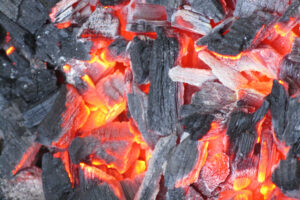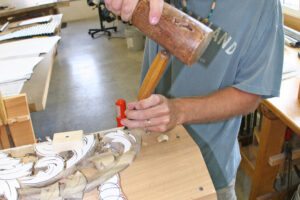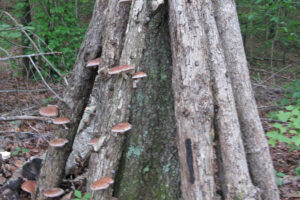While people are generally familiar with the most common forest products, such as lumber and paper, Virginia’s forests produce much more than sawtimber and pulpwood! Many unique products, which either grow naturally or are cultivated come from Virginia’s forests. These other products fuel unique markets for consumers, providing additional opportunities for businesses.
If you have trees on your land, you can make money from your woods without selling all your trees. Your woodlot has resources such as firewood, plants, and holiday greenery that you can sell. Here are some ways to make money from your property:
Firewood
After logging, there may be wood left on the ground that can be cut for firewood. Crooked trees or fallen trees also make great firewood. Save some trees with nests and hollows for wildlife. Know how to safely use chainsaws and protect your eyes and hearing. It is recommended that you consult a professional and write a contract if you are going to let others cut firewood on your land.
Charcoal
Charcoal, which burns hot and creates a flavorful smoke, is a popular heat source for grilling food. Use hardwoods only. Many resources are available online to teach you how to make charcoal.
Learn more about making charcoal.
Pine Straw
Gardeners and landscapers buy pine straw that is clean (no cones or other leaves). Longleaf pine needles are preferred, but other types of pine needles may also be desirable. Rake and bundle the pine straw yourself, or rent your land to someone else for raking. It is recommended that you consult a professional and write a contract if you are going to let others rake pine straw on your land.
Craft Materials and Decorations
Grapevine is used for baskets and wreaths. Pine garlands, pinecones, holly berries and leaves, running cedar, and mistletoe are used for holiday decorations. Dried flowers or seedpods are used for crafts.
Plants
Plants can be used in gardens and yards. You can dig up and sell ferns, small tree saplings, and flowering shrubs. Be sure to keep the plants alive and healthy. Ask your local forester or Cooperative Extension agent about trees and plants that are protected and regulated by law.
Learn more about endangered species.
Food
Pick and preserve berries, fruits, and nuts to sell. Learn which plants can be eaten, and process them so that they are safe to eat.
Edible Mushrooms
Naturally-growing mushrooms, such as morels (black and white), chanterelles, oyster mushrooms, lion’s mane, and more.
Learn more about edible mushrooms.
Cultivated mushrooms, such as shiitake, oyster shell, and wine cap mushrooms.
Learn more about forest farming of specialty mushrooms.
Caution: Only hunt mushrooms with someone who is highly experienced at identifying both edible and poisonous mushrooms. Even with edible wild mushrooms, consume a small quantity the first time you eat them to make certain your body has no negative reactions.
Edible Plants
Violet, dandelion, chickweed, garlic mustard, pineapple weed, and more.
Learn more about eating wild in Virginia.
Medicinal Plants/Herbs
Naturally-growing plants, such as American ginseng, goldenseal, black cohosh, bloodroot and more.
Learn more about medicinal plants.
Cultivated plants, such as American ginseng, goldenseal, black cohosh and mayapple.
Learn more about cultivating forest medicinals.
Caution: Wild ginseng is listed as a threatened species; harvest and sale is regulated by Virginia Department of Agriculture.
Syrups from Tree Sap
Sugar maple, birch, sycamore, and hickory.
Learn more about making syrup from tree sap.
Fruits and Nuts
Acorns, hickory nuts, black walnuts, persimmons, pawpaw, hazelnuts, pecans, crabapples, raspberries, and mulberries.
Learn more about native fruit and nut trees and shrubs in Virginia.
Hunting on your Land
Hunters may be willing to pay you to hunt in your woodland. You decide who can hunt and when.
Learn more about leasing land for hunting.
Places to Sell Forest Products
Many consumers are looking to buy local. Marketplaces like local farmer’s, arts and crafts, or community markets are more popular than ever.
- Fruit and craft stands
- Farmer’s markets
- Restaurants
- Convenience stores
- Flea markets
- Local nurseries
- Landscaping companies
Learn more about Virginia farmer’s markets, and fairs and festivals.
Additional Resources
[posts_table columns="image,title:Title,cf:id_number:ID,content:Description,tax:Media,button" post_type="document-library" rows_per_page="5" exclude_term="Audiences:no, Media:news-releases" term="document-tags:specialty-forest-products" filters="tax:document-category:Select Category,tax:Media:Select Content Type" search_box="true" reset_button="true"]Contact Us
For more information or questions, email us or use our contact form.



